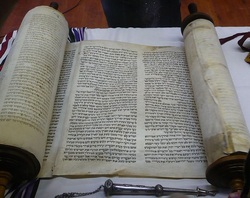 (9:3) [Israelites] stood up in their place and read from the Book of the Law of the LORD their God for a quarter of the day; for another quarter of it they made confession and worshiped the LORD their God. (9:5) Then the Levites...said, "Stand up and bless the LORD your God from everlasting to everlasting. Blessed be your glorious name, which is exalted above all blessing and praise. Nehemiah 9:7 (ESV) “You are the LORD, the God who chose Abram and brought him out of Ur of the Chaldeans and gave him the name Abraham. You found his heart faithful before you, and made with him the covenant to give to his offspring the land of the Canaanite, ...And you have kept your promise, for you are righteous." Outline. After Nehemiah describes the completion of Jerusalem's walls, he gives an accounting of the exiles who returned in chapter seven. Ezra is then shown reading the Law in the newly restored city as the people wept, which culminated in a restored celebration of the Festival of Booths. On the 24th day of the same month the renewal continued as people regathered, confessed their sins and praised God in what is seen as one long historical confession in chapter 9. This turns into a voluntary re-commitment to God's covenant, and (later with Nehemiah's second visit) support for the temple (13:4-14), sabbath keeping (13:5-22), and the divorcing of foreign wives (13:23-31). Historical Context. Judah was exiled to Babylon in waves beginning in 605BC, until the Persians came to power, which saw the first return under Zerubbabel in 538BC via Cyrus' decree. The city's rebuilding began with the temple's foundation in 536BC before opposition from the Samaritans halted all work for 15 years. The prophets Haggai and Zechariah encouraged the people, who then completed the temple in 516BC. Ezra doesn't arrive until 458BC and Nehemiah makes several trips beginning in 444BC with Artaxerxes' blessing. The reforms and covenant renewal seen here occurred with these latter reformers in hopes of preventing a relapse into unfaithfulness. Malachi likely spoke during this time (Pfeiffer, 435),1 making this the last renewal before Christ. Message Summary. God's has kept His covenant with Abraham, and thus the promise to bless all peoples via the “seed” of the woman, despite the centuries of Israel's wavering faithfulness. Dominant Theme. The confession of sins and ensuing renewal come only after the Word (promise) of God is read publicly for all the people to hear. The public confession led by the Levites also speaks of strongly of God keeping His promise to bless Abraham's descendants. The fact that over 30 verses are devoted to outline the extent of the Israel's failure to uphold their end of the covenant proves by contrast the steadfast faithfulness of God as He upheld His end of the covenant to keep His promise to bless all peoples. Thus, the Promise of God theme clearly emerges from this text. OT & NT Correlation. The chapter long confession starts by referencing Abraham's call from Ur and the promise/covenant with him to bless all peoples through his descendants (Gen. 11/12). The confession then walks through all the major events of Old Testament history: the Exodus from Egypt (Ex. 10:1), the Law given to Moses (Ex. 19:11), the people's stubbornness (Num. 20:7-13), eventual possession of the land (Deut. 1:8, Josh 11:23), their rebellion (Judges) and unfaithfulness (1 & 2 Kings), their exile (2 Chron. 36:16), and promise of restoration now partially fulfilled (Isa. 48:9). Interestingly, King David is absent, though God's covenant with Him may be referenced in God's keeping of His “covenant of love” (9:32, NIV). The concluding remarks “behold we are slaves this day” (9:36) “...affords clear proof that the leaders of post-Exilic Judaism did not regard their return from Babylon as final fulfillment of such prophecies of Israel's restoration to the land as Isa. 11:11-16; 14:1-2” (Pfeiffer, 442). God's promise to Eve, Abraham, and David thus continued. The divorcing of foreign wives to purify the Hebraic lineage later in Nehemiah also preserve the lineage of the Messiah, as seen in the genealogies of Christ (Matthew 1:1; Luke 3:23). These all conclude in God's loyalty to “keep his” promise to send Christ, even to the point of sacrificing the third member of the Trinity on the cross as a sacrifice for the sins of all peoples. As the author of Hebrews points out, God was faithful to His covenants till Christ could mediate a better covenant built on better promises (Hebrews 8:6).
0 Comments
Leave a Reply. |
AuthorBrett Yardley: Categories
All
Archives
January 2019
|

